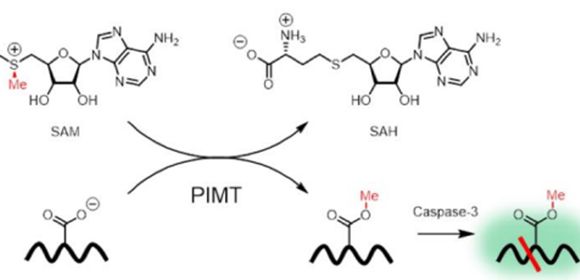
How tea catechin controls the function of proteins involved in gene expression clarified
A group of researchers from The University of Tokyo, Kyoto Prefectural University of Medicine, and Osaka University has clarified how catechin controls the function of proteins that are involved in gene expression.
For maintaining proper cell function, it is important to ensure expression of the correct gene programs in the right place and at the right time. This process is strictly controlled by various factors and one of several epigenetic mechanisms that cells use to control gene expression is DNA methylation.
In recent years, it was found that activity of enzymes that modify the methyl group is controlled by intracellular levels of methylation cofactor S-adenosyl-L-methionine (SAM). The understanding of the relationship between aberrant cellular SAM levels and disease phenotypes has drawn attention. Studies have reported that alteration of SAM levels is an important factor that contributes to the pathology of colorectal tumors.
In this study, the researchers developed a fluorescent probe-based high-throughput screening (HTS) system to efficiently search for the compounds that control cellular SAM levels. They performed cell-based HTS to search for compounds that control the cellular SAM levels in colorectal tumor cells using a 1600 drug repositioning compound library from the Drug Discovery Initiative (by The University of Tokyo), which contains approved drugs and bioactive compounds, finding that catechin in green tea significantly lowered cellular SAM levels in colorectal tumor cells.
They clarified that catechin consumed SAM when it was methylated by catechol-O-methyltransferase (COMT), an enzyme involved in the degradation of catecholamine neurotransmitters, and played a role in colorectal cancer and lowered cellular SAM levels.
The team also confirmed that the SAM levels lowered by catechin reduced histone methylation in colorectal tumor cells and increased the susceptibility of colorectal tumor cells to apoptosis. This led to their discovery that naturally occurring catechols decrease the cellular SAM levels via the activity of COMT and control phenotype deterioration in colorectal tumor cells.
Many researchers have studied health benefits of green tea catechins (GTCs). Although actions of catechin at the cellular level, such as antioxidant effects, inhibiting enzymes, and protein modification, have been clarified, the effects of these actions on health have not been well explained. The reduction of histone methylation by lowering cellular SAM levels will explain health benefits of green tea and catechin.
Figure 1
Figure 2
Figure 3
Figure 4
Figure 5
The article, "Metabolic Pathway-oriented Screening Targeting S-Adenosyl-L-methionine Reveals the Epigenetic Remodeling Activities of Naturally Occurring Catechols," was published in Journal of the American Chemical Society at DOI: http://dx.doi.org/10.1021/jacs.9b08698 .
Related Links
